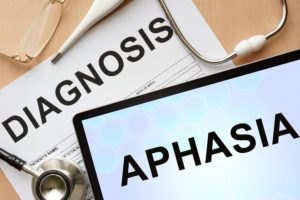What Are Some Signs and Symptoms of Aphasia?
June is Aphasia Awareness Month. Though this condition impacts more than 2 million people throughout the United States, including approximately 25 to 40 percent of stroke survivors, making it more common than a variety of other conditions such as Parkinson’s disease, the majority of people do not know what it is or how it impacts people.

Elder Care Bellevue WA – What Are Some Signs and Symptoms of Aphasia?
As a family caregiver it is important that you not only understand this language disorder, but that you can identify potential signs and symptoms of it so that you can ensure your parent gets the care, support, and management that is right for them. It is important to note that the symptoms that your senior may experience will depend on the severity of the damage and the area of the brain that is influenced by the damage.
Some of the signs and symptoms of aphasia include:
• Difficulty coming up with the right words when they are trying to talk with someone
• Frequently replacing words in their spoken language with words that may be related to the word that they want to say, or the meaning of that word
• Frequently replacing words in their spoken language with nonsense sounds or made-up words
• Struggles coming up with sentences
• Having difficulty understanding what others are saying to them, especially when those people are speaking to them at a fast pace
• Having difficulty understanding what people are saying to them when there is a considerable amount of background noise
• Taking the literal meaning of figures of speech, not being able to understand jokes, or misinterpreting sarcasm
• Having difficulty understanding written language, such as books, forms, magazines, or signs
• New challenges with spelling
• Difficulties being able to properly put together words in order to create fluent sentences that make sense
• Having a hard time understanding number concepts that they previously didn’t have trouble with, such as counting money or telling time accurately
Starting elder care for your aging parent can be one of the best decisions that you can make for them throughout the course of your caregiver journey with them. An elder home care services provider can be with your senior on a customized schedule that ensures that no matter the type of care that is right for them, they will get what they need when they need it. This ensures that they are able to receive all of the care, support, and assistance that is right for them while also keeping you at the forefront of their care routine.
There is a misconception that elder care is only appropriate for those seniors who are very “old” or who have extensive needs. This is not the case. Instead, even elders who are dealing with mild to moderate needs can also gain tremendous benefits from this type of highly personalized care, helping them to manage their needs, take care of their activities of daily living, and maintain a more active, engaged, and fulfilling quality of life as they age in place.
Source: https://www.aphasia.org/aphasia-resources/aphasia-statistics/
If you or an aging loved one are considering Elder Care Services in Bellevue WA, contact the caring staff at Hospitality Home Care today. Call us at (206) 966-6552.
- Is Chocolate a Healthy Valentine’s Day Treat? - February 1, 2018
- Preventing Hip Fractures in Elders - January 24, 2018
- Ways to Work Out When It’s Too Cold to Go Outside - January 18, 2018